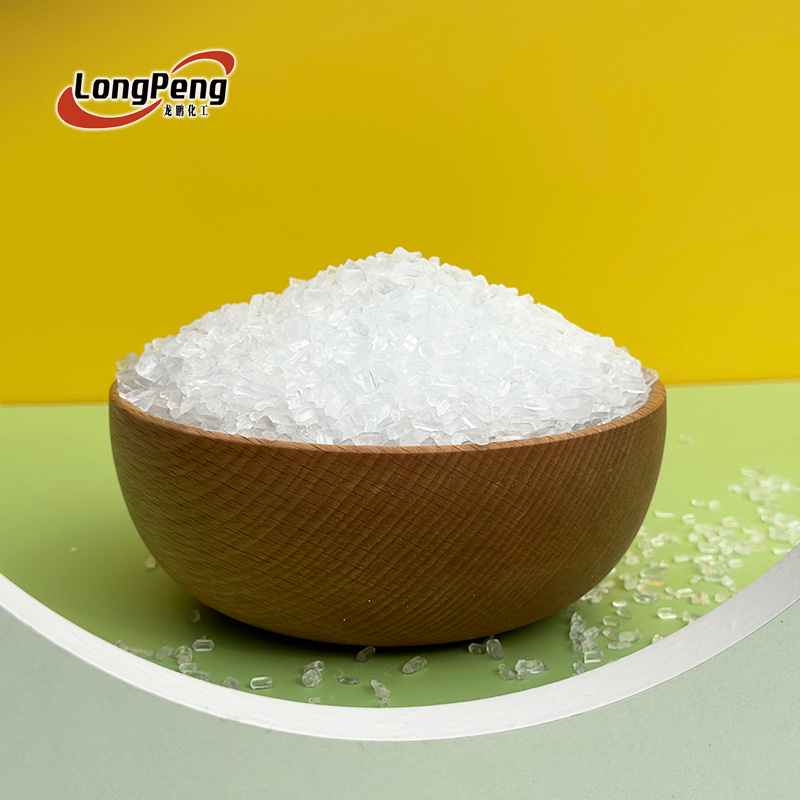As a leading provider of high-quality magnesium sulfate heptahydrate, LongPeng understands the importance of choosing the right chemical compounds for various industrial and medical applications. In this article, we will compare the applications and benefits of two essential magnesium compounds: magnesium chloride vs. magnesium sulfate. By exploring their distinct properties and diverse uses, LongPeng aims to provide valuable insights into these compounds and their potential advantages.

Understanding Magnesium Chloride vs.Magnesium Sulfate
Magnesium chloride is an inorganic compound composed of magnesium and chlorine. It is widely recognized for its hygroscopic nature and ability to attract and retain moisture. Magnesium chloride is commonly found in both natural deposits and as a byproduct of saltwater evaporation.
Magnesium sulfate, also known as Epsom salt or bitter salt, is a compound that consists of magnesium, sulfur, and oxygen. It occurs naturally in mineral springs and is obtained through chemical processes. Magnesium sulfate is renowned for its various applications in different industries.
Analyzing the Applications and Benefits
Industrial Applications and Benefits
Magnesium Chloride
De-icing and Snow Removal: Magnesium chloride is widely used as a de-icing agent due to its ability to lower the freezing point of water. It helps prevent ice formation and offers enhanced traction on roads and walkways.
Dust Control: Magnesium chloride is effective in controlling dust on unpaved surfaces, such as construction sites and mining areas. Its hygroscopic properties enable it to retain moisture and reduce airborne dust particles.
Concrete and Construction: Magnesium chloride is utilized as an additive in concrete production to enhance its strength and durability. It can also be employed as a dust suppressant during construction activities.
Magnesium Sulfate
Agriculture and Horticulture: Magnesium sulfate is a vital component in fertilizers and soil amendments. It helps replenish magnesium levels in the soil, promoting healthy plant growth and improving nutrient uptake.
Textiles and Dyeing: Magnesium sulfate is used in the textile industry as a dyeing assistant and flame retardant. It aids in dye absorption, improves color fastness, and enhances the fabric’s flame resistance.
Chemical Manufacturing: Magnesium sulfate finds applications in various chemical processes, such as catalysts, paper production, plastics, pigments, and fireproof materials. Its versatile nature contributes to the formulation of diverse chemical products.
Medical and Pharmaceutical Uses
Magnesium Chloride
Nutritional Supplements: Magnesium chloride supplements are consumed to address magnesium deficiencies in the body. It plays a crucial role in maintaining proper muscle function, nerve transmission, and bone health.
Topical Applications: Magnesium chloride solutions and creams are used for transdermal magnesium absorption. This method delivers magnesium directly to the skin, aiding in muscle relaxation and relieving muscular aches and pains.
Magnesium Sulfate
Epsom Salt Baths: Magnesium sulfate is a key ingredient in Epsom salt baths, which are renowned for their potential to relax muscles, reduce stress, and promote overall well-being.
Medical Treatments: Magnesium sulfate is used in medical settings for conditions such as eclampsia and preterm labor. It can help prevent seizures and facilitate smooth muscle relaxation during childbirth.
Conclusion
In the comparison between magnesium chloride and magnesium sulfate, both compounds offer unique applications and benefits across various industries. While magnesium chloride excels in de-icing, dust control, and concrete production, magnesium sulfate finds its strength in agriculture, textiles, and chemical manufacturing. As an industry-leading supplier, LongPeng ensures the highest quality magnesium sulfate heptahydrate, empowering businesses with versatile solutions for their specific needs. Embrace the advantages of magnesium chloride and magnesium sulfate, and unlock the potential they hold for your industry.
Read also:
